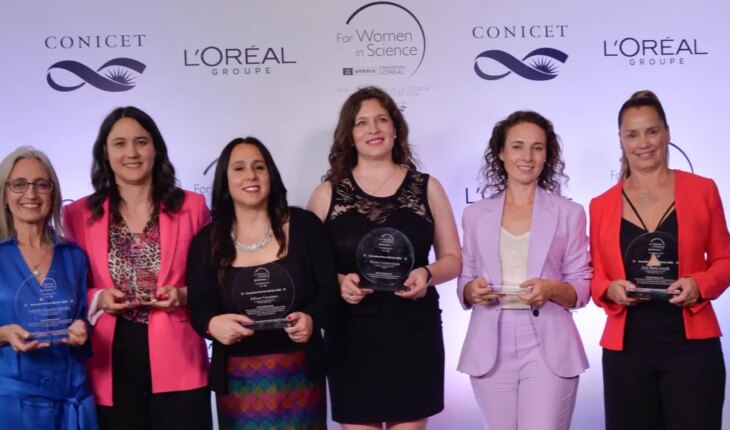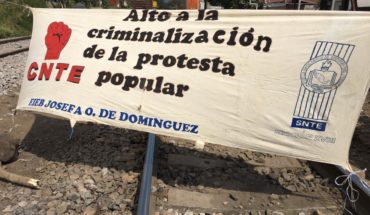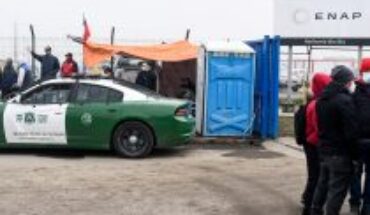Only 33% of R+D researchers worldwide are women, according to the UNESCO Institute for Statistics. In a context of profound invisibility of women in the scientific field, L’Oréal Argentina, together with the National Council for Scientific and Technical Research (CONICET), has been carrying out the L’Oréal-UNESCO National Award “For Women in Science” for 17 years, which in this last edition was focused on “Life Sciences”. The initiative aims to promote the role of women in the scientific field, awaken scientific vocations among girls, support young researchers and reward excellence in a field in which women should be much more present. Since 1998, the L’Oréal-UNESCO “For Women in Science” programme has recognized and celebrated eminent women in science around the world. To date, the L’Oréal-UNESCO partnership has distinguished more than 4,100 women scientists, including 127 international laureates and more than 4,000 young researchers. (The winners of the prizes and special mentions together with the hosts of the event) INTERNATIONAL 25TH ANNIVERSARY SURVEY: IMPACT AND SCOPE OF THE AWARDThe first for this year, an impact survey of more than 3000 International Prize laureates has been carried out, on 1228 winners from 95 countries from January to March 2023, which revealed the following data:- 97% of the winners continue to work in science-related fields and 95% in the same discipline.
– 93% planned to continue working in science in the next 5-10 years
– The vast majority of them (95%) stated that the award had brought them greater visibility, which can be a valuable asset in their career advancement
– The award seems to have boosted the winners’ self-confidence, with 93% of them saying they feel more confident in their work.
– 81% of survey participants stated that the award had opened professional doors for them. In Argentina, the L’Oreal – UNESCO Prize “For Women in Science” has been held for 17 years in collaboration with CONICET (National Council for Scientific and Technical Research), recognizing so far 66 women scientists – including the winners of the current edition – representing provinces and cities throughout the country. Since 2017, the number of recognitions in the local award has extended from 4 to 6. At the same time, Argentina has obtained 10 women scientists recognized in the L’Oréal-UNESCO International Prize “For Women in Science”, being the Latin American country with the highest number of winners in the region: 7 Laureates and 3 in the Rising Talent category. It continued under the communication campaign: Science changes the world, they change the rules. The projects that participated were framed in the Life Sciences, specifically in one or more spheres of one of the following areas/disciplines: Medical Sciences; Life sciences; Biochemical Sciences and Molecular Biology; Veterinary Sciences; This year, the winner of the Award Category was Dr. Juliana Cassataro, researcher at the Institute of Biotechnological Research of CONICET and the National University of San Martín. Their project “Evaluation of the antibody response against SARS-COV-2 antigens in a subpopulation of participants in the phase 2/3 trial of the ARVAC Cecilia Grierson vaccine”, aims to develop and produce in Argentina a recombinant adjuvanted vaccine for boosters and variant change against COVID-19 that is conserved between 2 and 8 °C. This is the first COVID-19 vaccine in the country approved by ANMAT. (The winner of the Award Category was Dr. Juliana Cassataro and the winner of the Scholarship Category was Dr. Mónica García) In 2019, Juliana was mentioned in the Award Category in the “For Women in Science” Program, for her project “Development of new adjuvants to improve the oral administration of vaccines”. Today, Juliana leads the research group on Immunology, Infectious Diseases and Vaccine Development at the Institute of Biotechnological Research (IIBIO CONICET-EByN UNSAM) San Martín, Argentina. About his work, he highlights: “We have been working on this project for a long time, so in addition to the satisfaction of having completed all the phases of a 100% Argentine vaccine, we are proud to have a capacity toand the networks to take on new projects.”The winner of the Scholarship Category was Dr. Mónica García, Researcher at the Pharmaceutical Technology Research and Development Unit of CONICET and the National University of Córdoba, for her work “Biometric nanomedicines for chemo and immunotherapy of breast cancer”. Through this, it seeks to develop promising therapeutic alternatives through nanomedicines that allow the therapeutic effect to be localized at the site of action-tumor. In 2020, Mónica was mentioned in the Scholarship Category in the “For Women in Science” Program, for her project “Nanostructured and bioresponsive hybrid materials to optimize the therapeutic action of antitumor drugs”. Mónica is an Argentine scientist born on May 25, 1987 in San Rafael, Mendoza. She began her academic journey in her hometown and excelled as a National Flag Bearer in high school, receiving the Gold Medal for best GPA in 2004. His main line of research focuses on the nanomedicine of cancer.“Women have fought tirelessly to break barriers and leave our mark on the universe of science; especially in the STEM field, where we face greater difficulties for our professional development. Despite the challenges, prejudices and labels, our contribution has been and is undeniable. Even so, there are still inequities in funding, promotion, and access to leadership positions. This highlights the incredible resilience of women scientists and the importance of awards like this that make women working in the scientific field visible and put at the centre of the stage”, she says about the role of women in science. (L’Oréal – UNESCO Prize “For Women in Science”) The award ceremony was attended by the highest authorities of the institutions participating in the Award, such as Jean-Noël Divet, President and CEO of L’Oréal Argentina; and Dr. Ana Franchi, President of CONICET. In addition, the ceremony had the prestige of having the presence of the Minister of Science, Technology and Innovation of the Argentine Nation, Mr. Daniel Filmus.“This year has a special imprint, L’Oréal celebrates 60 years of experience in the country, and the Award celebrates its 25th anniversary internationally and 17 locally, which reflects our tireless work and commitment to gender equality, especially in relation to opportunities within the labor market and, in particular, in the scientific field. Having today 6 new Argentine scientists recognized for their work fills us with pride, and encourages us to continue recovering the names of those who are capable of changing the world with their findings”said Jean-Noël Divet, President and CEO of L’Oréal Argentina. Minister Daniel Filmus congratulated L’Oréal “For having supported this award for 17 years, and to the recipients of this edition, who have had a really very demanding jury and that their projects are initiatives that serve to improve the living conditions of our people. Science undoubtedly plays a decisive role in the country’s development. Women have a disadvantageous condition in their development within science”said the Minister. “And in Argentina we have a particular characteristic: there are more women scientists than men. However, when you look at the different echelons, you find that women have much more difficulty gaining access, and if you go to the heads of institutes, for example, they are undoubtedly a much smaller proportion.” The president of CONICET, Ana Franchi, congratulated the winners and all those who applied, and said: “First of all, I want to thank L’Oréal, which for the 17th time trusts and works together with CONICET and maintains continuity in this award that is a push to several women to move forward in a career that is not easy”. Franchi also highlighted the importance of the public-private partnership, the work of the juries that evaluated more than one hundred projects and the federal nature of the award. He concluded: “This award says that science needs women and women need science that is more inclusive. We have a little more than 63% of women in our organizations and very few in decision-making positions. Today, more than ever, I want to highlight that science and technology are the engine of development for an inclusive country.”.
The scientist distinguished in the Award Category received financial support of $3,000,000 and the winner of the Scholarship Category was awarded $2,000,000, in order to that they can continue to develop their projects. (The winners of the special mentions) At the same time, in the Award Category, Dr. Ana María Laxalt, researcher at the Institute of Biological Research of CONICET and the National University of Mar del Plata, was recognized with mentions for her project “Phospholipase C in Stress: Disease Control in Tomatoes through Genetic Editing and Use of Arabidopsis as an Experimental Model”. and Dr. Gabriela Salvador, researcher at the Biochemical Research Institute of Bahía Blanca of CONICET and the National University of the South, for her work “Lipid mediators of pro-resolution: relevance in neuronal injury processes triggers of neuroinflammation”. On the other hand, in the Scholarship Category, Dr. María Julia Lamberti, researcher at the Institute of Environmental Biotechnology and Health of CONICET and the National University of Río Cuarto, Córdoba, were distinguished for her project “Development of a vaccine for dendritic cells with tumor lysates generated by photodynamic therapy for the treatment of melanoma”, and Dr. Melisa Olave, She is a researcher at the Argentine Institute for Research on Arid Zones of CONICET, the Government of Mendoza and the National University of Cuyo. She is distinguished for her work “Necessary and urgent scientific bases to define efficient strategies for biodiversity conservation in the face of the sixth mass extinction”. During the ceremony, the television host, radio presenter and journalist, Diana Zurco, presented the current context in the scientific field at an international and local level, the main challenges and the data of a valuable impact survey of more than 3000 winners of the International Award. For their part, the renowned science journalists Daniela Blanco, Director of Science, Health and Trends at Infobae, and Nora Bär, science journalist, editor and columnist, were responsible for interviewing the winners and mentions of this edition, managing to get to the heart of their projects.
The L’Oréal-UNESCO National Prize “For Women in Science” has been collaborating for 17 years with the aim not only of modifying the shocking figures that reflect gender inequality in this field, but also of promoting gender equality and the empowerment of women in science.
Six Argentine women scientists were recognized with the L’Oréal-UNESCO National Award “For Women in Science”
November 27, 2023 |





